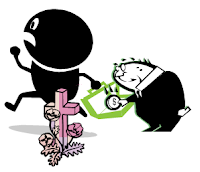Look Who’s Trying to Collect from Beyond the Grave
What happened to your debts when you die? As seniors increase their debt during retirement, you should know what happens to debts when you die. According to FoxBuisness.com“Nearly 40% of all seniors say they have accumulated debt in their retirement years with no plans to pay it off in their lifetime. Are the heirs and next of kin responsible?
There is not an easy answer and it all depends on the situation. The first thing to do in all cases is to notify all creditors of the death. Normally, the estate and the executor who handles the estate will liquidate the assets, pay creditors and distribute the proceeds according to your last will and testament or it will be distributed according to state laws.
If there is not enough money to pay all creditors, the general order of who gets their money is:
1. Funeral expenses, taxes and administrative fees
2. Secured creditors such as mortgage loans, car loans, etc. These creditors have the rights to the assets securing the loan.
3. Unsecured creditors…if there is any money left. If there is no money left, the creditor will contact the co-signer and the co-signer is legally responsible for the debt. If the debt was just in the deceased name, most credit card companies will write off the debt.
However, more and more credit card companies are outsourcing their collections and contacting the next-of-kin trying to collect based on “moral obligation.” Saturday’sWall Street Journal has an article describing how collection firms are targeting survivors to try to collect at least some of the debt. According to this article, “Collectors are starting to realize just how much money you can get from someone when they are at their most vulnerable.” Many survivors pay some or all of the debts just to stop the collectors from calling and bringing on recent memories of the deceased, even though they are not legally obligated to pay.
Here are some of the facts you should know:
- The Credit Card Accountability, Responsibility and Disclosure (CARD) Act of 2009 prohibits creditors from charging late fees or annual fees during estate settlement.
- Not all monies are available to creditors. Retirement accounts such as 401(k)s and IRAs don’t pass through the estate, but go directly to the beneficiary.
- Under the FairDebt Collection Practices Act , collectors cannot do the following:
- Call before 8:00 a.m. or after 9:00 p.m.
- Call at work if you ask them not to
- Harass you, use obscene or profane language or threaten the use of violence or other criminal means to harm you, your reputation, or your property
- Conceal his or her identity on the phone
- Lie or falsely imply that you have committed a crime
- Disregard a written request from you to cease further contact
- Falsely represent the amount, character or legal status of debt
- Continue to contact you if you ask them in writing to stop
If you feel you are being harassed, contact your state’s Attorney General’s office and the Federal Trade Commission with the details of the phone call or harassing activity. You may not be liable for the debt and you have rights to keep you from being harassed.


Comments
Post a Comment